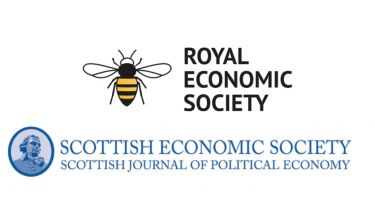The Royal Economic Society and the Scottish Economic Society will be hosting a combined conference in 2023, which will be held from 3-5 April 2023 at the University of Glasgow. This joint conference will be a celebration of Adam Smith’s 300th birthday. The research of a number of academics from the Department of Economics will be presented at the conference, covering subjects of labour market discrimination, land and gender inequality, the rise of teleworking, Mutual Recognition Agreement, and urban regeneration projects.
Our featured academics will be:
Andy Dickerson (Conference paper link)
Jesse Matheson (Conference paper link)
Antonio Navas(Conference paper link)
Anita Ratcliffe(Conference paper link)
Argyris Sakalis(Conference paper link)
Nicolas Van de Sijpe(Conference paper link)
This year’s conference will see Professor Sarah Brown of the University of Sheffield taking over as President of the Scottish Economic Society. The Scottish Economic Society is the successor from 1954 to the Scottish Society of Economists founded in 1897. Sarah is a Research Fellow at the IZA (Institute for the Study of Labour, Bonn) and an Associate Fellow at the Sheffield Political Economy Research Institute (SPERI).
The full list of our papers to be presented is attached below.
Anticipated labour market discrimination and educational achievement
Professor Andy Dickerson1, Dr Anita Ratcliffe1, Dr Bertha Rohenkohl2,1, Dr Nicolas Van de Sijpe1
1University of Sheffield, United Kingdom.
2Institute for the Future of Work, United Kingdom
Synopsis
We document the relationship between anticipated labour market discrimination and educational attainment in England. Our findings are that ethnic minority students who report anticipating labour market discrimination achieve grades in English, maths, and science that are approximately one quarter of a grade higher than other ethnic minority students who do not anticipate such discrimination. They are also more likely to reach the coveted `gold standard' of at least five GCSEs with grades A*-C in subjects including English and maths.
Agri-Culture of the Motherland: The effect of land inequality on gender equality beliefs.
Dr Argyris Sakalis
University of Sheffield, Department of Economics, United Kingdom
Synopsis
Contemporary beliefs towards gender equality focus on the position and role of women in society, and differ across countries. These beliefs include their participation in the labour market, higher education, and politics. I explore how differences in historical land ownership have a negative effect on beliefs about gender equality. I also trace historical land inequality on the beliefs of second-generation immigrants. The mother's country of origin appears to drive the effect, consistent with similar findings from cultural transmission literature.
How the rise of teleworking will reshape labor markets and cities
Dr Jesse Matheson1, Dr. Toshitaka Gokan2, Dr. Sergei Kichko3, Professor Jacques-Francois Thisse4
1University of Sheffield, United Kingdom.
2Institute of Developing Economies, Japan.
3University of Trento, Italy.
4CORE-UCLouvain, Belgium
Synopsis
The recent shift towards more work being done away from the office is truly becoming a “new normal”. In this paper we study how teleworking will impact cities through the lens of a monocentric city model with heterogeneous workers. We examine the implications of increased teleworking for land rents and the allocation of labor between the local services sector and the final goods sector. Using empirical evidence from housing prices in England, we test the model’s predictions.
Urban Regeneration Projects and Crime: Evidence from Glasgow
Dr Daniel Borbely1, Mr Gennaro Rossi2
1University of Dundee, United Kingdom.
2University of Sheffield, United Kingdom
Synopsis
This paper examines the effects of large-scale urban regeneration projects on crime using the city of Glasgow, in Scotland, as a case study. We leverage differences in the timing of these projects along with the distance to the areas affected in our empirical approach. We find evidence that urban regeneration projects reduce crime locally but not on the aggregate (city-wide) level.
Does Mutual Recognition Agreement facilitate trade? The case of the UK
MS Yangjun Han1, Dr. Wanyu Chung1,2, Dr. Antonio Navas3, Prof. Robert Elliott1
1University of Birmingham, United Kingdom.
2Centre for Economic Policy Research, United Kingdom.
3University of Sheffield, United Kingdom
Synopsis
Firms designate agents to handle the increasing administrative barriers while policymakers are keen to facilitate such cooperation by establishing the Mutual Recognition Agreement (MRA) of trusted trader programs, a widely-used yet rarely-studied trade facilitation policy. The UK trusted trader program, the Authorized Economic Operator (AEO), handles two thirds of UK exports where half are through agents. We are the first to provide theoretical and empirical evidence on the effectiveness of the UK-US MRA.

